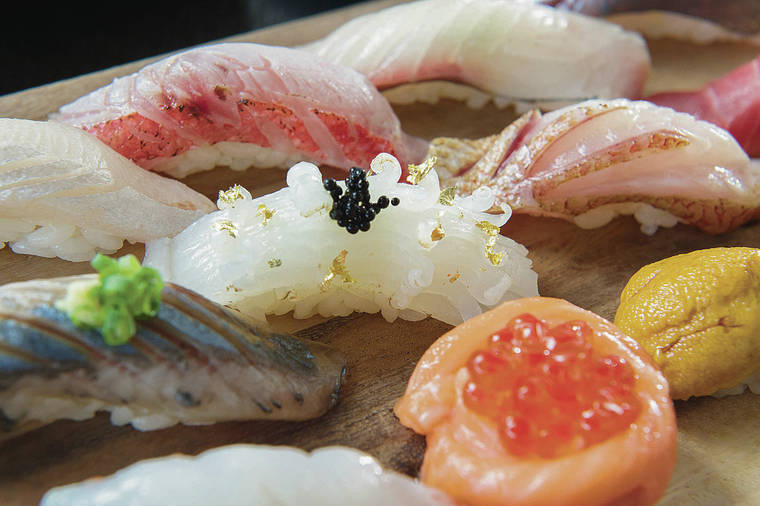Rave Reviews: Nadine Kam

CRAIG T. KOJIMA / 2018
At Akira, the chef’s choice menu option includes 15 pieces of sushi.
PREMIUM PICK: AKIRA
1150 S. King St.; 376-0928. Dinner. $$
Out of Taiki Kawai’s small kitchen comes some of the most refined Japanese fare available in Hawaii to date, geared toward lovers of the traditional.
Diners have the option of ordering a la carte, but newbies can get an introduction to the full Akira experience via two multicourse menus. At this writing, a $48 nine-course tasting menu is available for early birds in by 5:30 p.m., limited to 10 orders per day. Otherwise, the chef’s $85 kaiseki omakase shines with a full range of boiled, simmered and grilled dishes, plus sashimi and nigiri sushi.
The teaser-size portions associated with authentic Japanese kaiseki meals may not be for everyone, but each dish is like a perfect jewel, a joy for the eyes and soul, and the surprise element of each arrival is enthralling from beginning to end.
Some of the dishes on the tasting menu are also included on the regular a la carte menu. A few of my favorites include an appetizer of short rib paired with sea urchin, chawanmushi with shredded snow crab with an add-on uni option, sweet fried Tristan lobster with a coating of crunchy bubu arare, and simmered perch accompanied by a lightly fried agedashi potato ball.
Don't miss out on what's happening!
Stay in touch with breaking news, as it happens, conveniently in your email inbox. It's FREE!
Other specialties include a dashimaki egg omelet with crab sauce and, oddly, a single Korean-style dish, pork kim chee with cilantro.
More recently, the restaurant introduced happy hours Mondays to Saturdays, with a range of affordable pupu and teishoku-style dinner sets with a choice of one ($15) or two ($25) entrees. Choose from 12 selections, from a mini chirashi bowl to lobster and vegetable tempura.
SUNSET SMOKEHOUSE
23 S. Kamehameha Highway, Wahiawa; 476-1405. Lunch. $$
James Kim hasn’t had much sleep lately, thanks to the beef briskets, pork spareribs and St. Louis ribs he tends to so lovingly at his new restaurant in Wahiawa.
Kim stays true to the central Texas-style of barbecue that he grew up with, a craft method that he describes as using “real wood, fire and a lot of labor. It’s a very old-school style.
“We just use a salt-pepper rub, keep it real simple, let the meat do the talkin’, and if you want to use sauce, well, that’s up to ya’ll but we recommend not to put the sauce on top of the meat, but on the side, for dipping. That’s the best way. At least that’s how I grew up with it.”
German and Czech butchers introduced smoking techniques and smoked sausages to Central Texas in the 1800s, where the specialty became beef brisket in a salt-and-pepper crust, or bark.
The black bark can scare the non-initiated into thinking the meat is burnt, but it’s a desired part of the finished product. It’s formed through the Maillard, or chemical, reaction that occurs when amino acids and sugars meet heat, creating chains of flavor compounds.
From start to finish, it takes about 14 hours to complete a smoke, and Kim gets little sleep because he is constantly monitoring the process. His meats are so popular he was having trouble keeping up with demand. His meat — sold by the pound — was selling out within one to two hours of opening, so he recently had a second 1,000-gallon smoker built to increase capacity.
Those lucky enough to score a couple of pounds are in for a treat. Kim’s brisket arrives from the smoker jiggly from a combination of rendered fat and juice, wrapped in foil to prevent moisture evaporation and protect the bark. It’s set to rest while it resorbs juices, resulting in brisket that is easy to pull apart. In central Texas style, no knives are needed.
YAKITORI ANDO
1215 Center St., Kaimuki; 739-5702. Dinner, late night. $$
Nobody likes to experience sticker shock at a restaurant, that feeling of being gouged for no apparent reason. I had the opposite experience at Yakitori Ando, the latest endeavor by chef Takashi Ando, former grill master for Kohnotori.
Ando opened his small hidden-in-plain-sight restaurant behind the Waialae Avenue branch of Bank of Hawaii. He couldn’t be bothered with keeping track of dozens of small orders in the yakitori tradition, so he created an omakase experience instead, and will keep the skewers coming until diners decide to call it quits, for about half the price of most tasting menus in town.
That said, omakase yakitori is not for everyone. If you’re a finicky eater, stay home. There’s nothing worse than being that person who’s grossed out by hearts, gizzards, liver and cartilage — dampening the mood by refusing to eat food others are enjoying. If you think you might be that person, try to get a seat at one of the few tables in the restaurant and leave the bar counter to those who won’t insult Ando by refusing the offal that yakitori aficionados crave.
Meals start with a small salad and, occasionally, sliced green onions appear as spacers between pieces of chicken, but for the most part this is strictly a meat lover’s paradise. You may see chicken thighs simply seasoned with salt and pepper and grilled to tender doneness, crispy grilled wings, fatty chicken butts, bacon- wrapped quail eggs, bacon- wrapped mochi and grilled pork belly. Also, tsukune, the pillowy chicken meatballs perfectly sauced.
The one thing available by request is the popular motsunabe, or tripe stew.
Because this small restaurant is so popular, reservations are essential.
Nadine Kam is the Star-Advertiser’s restaurant critic. Her column, “The Weekly Eater,” appears every Wednesday in Crave.





